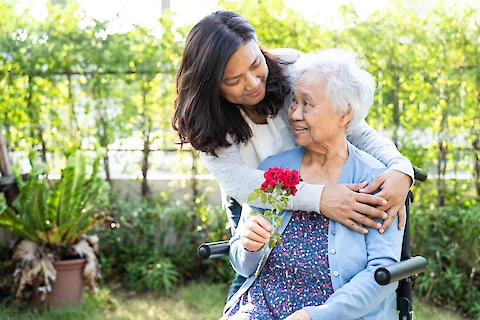
Understanding Dementia-Related Behavioral Changes at Different Ages and Stages
It can be challenging to manage the care of a loved one with dementia. Families and caregivers must understand that dementia-related behavioral changes may arise as the condition progresses through different stages.
Knowing what to expect and understanding the best ways to respond will help you provide the best care for your senior loved one during this difficult time.
Early-Stage Dementia: What to Know
In early-stage dementia, memory loss is typically mild but noticeable. Seniors probably live independently with minimal assistance from family members and caregivers. However, they will require more emotional support than ever to cope with any anxiety caused by confusion about unfamiliar activities or environments. Behaviorally speaking, there can be increased agitation. This might manifest in verbal outbursts like arguing with others when given instructions on performing certain tasks. If behaviors become disruptive, medical advice should be sought immediately so that proper interventions can occur.
How to Respond
When responding to someone with early-stage dementia, be patient and understanding. It can be helpful to use distraction techniques such as changing the topic of conversation or engaging in a calming activity.
Middle-Stage Dementia: What to Know
Middle-stage dementia is characterized by more severe memory loss and an inability to complete daily activities independently. Additionally, there may be an increase in confusion or disorientation to time and place and personality changes such as increased agitation or paranoia. Behaviors like wandering off or hiding objects can also become common at this stage.
How to Respond
When responding to someone with middle-stage dementia, be patient and understanding while providing support for any physical needs that arise due to difficulty completing daily tasks independently. Regular weekly visits will create trust and allow caregivers to ensure that needs are met sufficiently.
It can also be helpful to provide a safe environment by using visual cues (e.g., maps) and keeping doors locked when appropriate. Additionally, caregivers should keep the individual's identity intact by respecting their wishes when possible, even if they do not always make sense, as long as they don't impact safety and well-being.
Late-Stage Dementia: What to Know
Late-stage dementia can show severe memory loss, an inability to communicate effectively, and a need for around-the-clock care. Seniors may require help with all activities of daily living, such as eating and dressing. Additionally, they may experience physical changes such as difficulty walking or increased incontinence. They may also experience agitation or become withdrawn and unresponsive due to the severity of their cognitive decline. Behaviors like repetitive questioning, wandering off, or hiding objects can also become common at this stage.
How to Respond
Communicating with seniors with severe dementia requires patience, understanding, and empathy. Speak slowly and clearly, using simple language. Use gestures and nonverbal cues to help convey your message. Repeat important information multiple times. Avoid asking complex questions, correcting, or arguing.
Focus on the present, keep conversation simple and avoid past events that may cause confusion or distress. Be mindful of the senior's emotional state and redirect their attention if they become agitated. Remember to treat them with respect and dignity.
Senior Helpers Offers In-Home Dementia Care and Support
If you or a loved one is experiencing dementia-related behavioral changes, seek professional help. The team at Senior Helpers Summerville is here to support you through every stage of the journey.
We offer services in Summerville, Ridgeville, Saint Matthews, and the surrounding areas. Contact us today through our website or call us at (843) 900-8903 to learn more about our services and how we can help you provide the best possible care for your senior loved one.